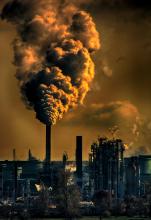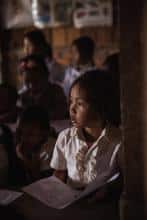By Alphonse Akouyu, Former ICSD Volunteer
John 1:5 – And the light shines in the darkness, and the darkness did not comprehend it.
What is the Darkness?
The world in which we live today needs light which can shine in darkness. This light reminds us of our duty to preserve light for future generations. In Matthew 5:14-15, we are told “You are the light of the world. A town built on a hill cannot be hidden. Neither do people light a lamp and put it under a bowl. Instead they put it on its stand, and it gives light to everyone in the house.”
As 2019 begins, humanity is in need of light more than ever. Light forms the backbone of all our endeavors and in a broader sense, it encompasses energy. Our ability to harness different energy options determines the kind the future we hope to see for ourselves and our children. But how can leaders of faith institutions give light to energize everyone?

UN Sustainable Development Goal (SDG) number 7 talks about ensuring access to affordable, reliable, sustainable and modern energy for all. The words of SDG 7 reflect the current energy situation in many communities around the world. These communities are faced with expensive, unreliable, unsustainable and archaic energy facilities which are causing more harm than good. In his apostolic exhortation ‘Laudato Si’, Pope Francis reflects on these challenges: ‘There is an urgent need to develop policies so that, in the next few years, the emission of carbon dioxide and other highly polluting gases can be drastically reduced, for example, substituting for fossil fuels and developing sources of renewable energy’.
The Numbers
According to the United Nations Statistics Division in 2016, 1.1 billion people live without essential energy services. Furthermore, about three billion people, the majority in Asia and sub-Saharan Africa, still lack access to clean and safe cooking fuels and technologies. This inaccessibility presents many health hazards and results in millions of deaths each year due to household air pollution. Although 80 million people globally gained access to clean cooking fuels and technologies during 2012-2014, population growth offset this gain. In 2017, 1.06 billion people still lived without this essential service, with 80% of them concentrated in just 20 countries. While some 86 million people a year were able to access electricity for the first time, it’s still a major challenge to provide electrification rapidly enough to outpace growing populations.
The People Behind the Numbers

The biggest difficulty with numbers is that they hardly present a reality of a situation; they are faceless statistics. Friends, we need to start thinking about the people behind these numbers, many of whom include our dear brothers and sisters. We need to put ourselves in the shoes of these 1.6 billion humans who are made in the image of our God and, for once, think about the daily challenges they encounter as a result of lack of access to basic forms of energy. We need to think about the children whose education is feeling the hit as a result. We need to think about the people suffering from many health hazards because of lack of access. And what about those who have paid the ultimate price – with their lives – because of this issue? We need to think about the people behind the numbers!
What Can You Do?
Albert Einstein once said, “We cannot solve our problems with the same thinking we used when we created them”. The energy problems we face today require a new kind of thinking – one which is based on innovation, social impact, sustainability, affordability, and efficiency. For those of us engaged in sustainable development, we share the vision of Mother Teresa: doing small things in great ways. What is that small idea of yours which can be done in a great way to change the lives of the people behind the numbers?

In the book of 1 Peter 4:10, we are told “Each of you should use whatever gift you have received to serve others, as faithful stewards of God’s grace in its various forms.” I strongly believe Peter’s words, especially the ability of humanity to provide solutions for humanity-caused problems. I opine to the view that the next generation of faith leaders must be considered partners in development and can contribute by using their gifts to serve others and solve energy problems. Dear friends, we need to start loving not only with words but with deeds, by sharing solutions to current energy issues AND believing it can be done.





